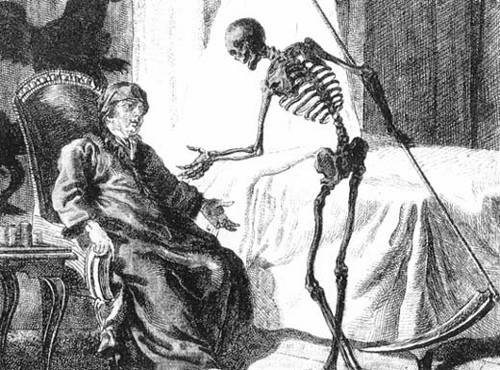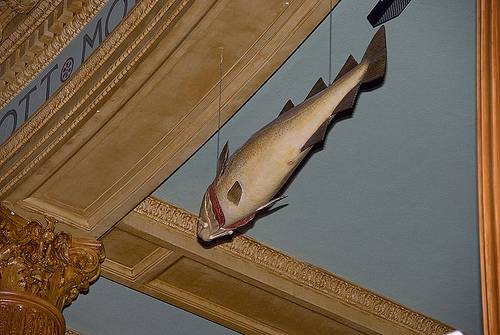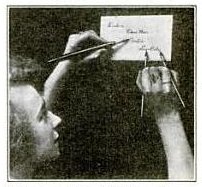“Honor is a luxury for aristocrats, but it is a necessity for hall porters.” — G.K. Chesterton
The Visby Lenses
In 1997, three scientists examined 10 rock crystal lenses discovered in a Viking grave on Sweden’s Gotland Island. Made in the 12th century, the lenses had been thought to be simple ornaments, but examination showed they had been crafted with the ideal focusing lens shape 500 years before Descartes could calculate it mathematically.
“It seems that the elliptical lens design was invented much earlier that we thought and then the knowledge was lost,” researcher Olaf Schmidt told the BBC. Scientists speculate that the lenses were used to start fires or perhaps even to form a crude telescope.
Who made them? Not Vikings — probably a group of craftsmen in Byzantium or Eastern Europe, possibly even a single talented artisan. Whoever it was, he knew even more about applied optics than scientists at the time.
Infinite Egress

Leinbach had discovered a proof that there really is no death. It is beyond question, he had declared, that not only at the moment of drowning, but at all the moments of death of any nature, one lives over again his past life with a rapidity inconceivable to others. This remembered life must also have a last moment, and this last moment its own last moment, and so on, and hence, dying is itself eternity, and hence, in accordance with the theory of limits, one may approach death but can never reach it.
— Arthur Schnitzler, Flight Into Darkness, 1931
Thou Whoreson Zed!
What’s unique about this poem?
Weary with toil, I haste me to my bed,
The dear repose for limbs with travel tired;
But then begins a journey in my head,
To work my mind, when body’s work’s expired:
For then my thoughts, from far where I abide,
Intend a zealous pilgrimage to thee,
And keep my drooping eyelids open wide,
Looking on darkness which the blind do see
Save that my soul’s imaginary sight
Presents thy shadow to my sightless view,
Which, like a jewel hung in ghastly night,
Makes black night beauteous and her old face new.
Lo! thus, by day my limbs, by night my mind,
For thee and for myself no quiet find.
It’s the only one of Shakespeare’s 154 sonnets that contains all 26 letters of the alphabet.
Con Proofing
John von Neumann suggested a way to flip a suspect coin and produce fair results: Flip it twice.
Tails-heads decides in favor of one party, heads-tails the other. The two results are equally likely, even with a biased coin. (If it comes up heads-heads or tails-tails, flip it twice again.)
Birds of a Feather

The 14th Lord Berners, Gerald Tyrwhitt-Wilson (1883-1950), was either eccentric or poetic-minded — he used to dye the pigeons at his Faringdon manor house so that when released they became, in Nancy Mitford’s phrase, “a cloud of confetti in the sky.”
Berners also kept a giraffe, installed a piano in his Rolls Royce, and once received Penelope Betjeman’s horse into his drawing room for tea. When a Miss Lobb complained that a tower erected on his Oxfordshire estate would invite suicides, he nailed up a notice: “Members of the Public committing suicide from this tower do so at their own risk.”
What’s In a Name?
Puritans in the 1600s gave their kids some memorably pious names — here’s a sample from a Sussex jury roll circa 1650:
- Accepted Trevor, of Norsham
- Redeemed Compton, of Battle
- Kill-Sin Pimple, of Witham
- Fly-Fornication Richardson, of Waldron
- Search-The-Scriptures Moreton, of Salehurst
- The-Peace-Of-God Knight, of Burwash
- Stand-Fast-On-High Stringer, of Crowhurst
- Fight-The-Good-Fight-Of-Faith White, of Ewhurst
Taken to extremes these could get unwieldy. Charles Bombaugh (1890) claims that “A Puritan maiden, who was asked for her baptismal name, replied, ‘Through-Much-Tribulation-We-Enter-The-Kingdom-Of-Heaven, but for short they call me Tribby.'”
In the late 17th century a member of the British parliament was named Praise-God Barebone, with brothers and sons named Fear-God Barebone, Jesus-Christ-Came-Into-The-World-To-Save Barebone, and If-Christ-Had-Not-Died-For-Thee-Thou-Hadst-Been-Damned Barebone.
The last changed his name to Nicholas.
Founders and Flounders

In the Massachusetts House of Representatives hangs a 5-foot pine cod, a historic symbol of the fishing industry. It’s known as the Sacred Cod of Massachusetts.
The Senate, not to be outdone, has a brass fish surmounting its chandelier.
It’s known as the Holy Mackerel.

In a Word
lethologica
n. the inability to remember a word
In her 1989 textbook Cognition, psychologist Margaret Matlin notes that most people who read the definitions below find it hard to summon the words they refer to. How many can you name? I’ll give the answers tomorrow.
- An absolute ruler, a tyrant.
- A stone having a cavity lined with crystals.
- A great circle of the earth passing through the geographic poles and any given point on the earth’s surface.
- Worthy of respect or reverence by reason of age and dignity.
- Shedding leaves each year, as opposed to evergreen.
- A person appointed to act as a substitute for another.
- Five offspring born at a single birth.
- A special quality of leadership that captures the popular imagination and inspires unswerving allegiance.
- The red coloring matter of the red blood corpuscles.
- Flying reptile that was extinct at the end of the Mesozoic era.
- A spring from which hot water, steam, or mud gushes out at intervals, found in Yellowstone National Park.
- The second stomach of a bird, which has thick, muscular walls.
- The green coloring matter found in plants.
- The long-haired wild ox of central Asia, often domesticated as a beast of burden.
- The art of speaking in such a way that the voice seems to come from another place.
All Hands on Deck

James Garfield, when not proving the Pythagorean theorem, could write simultaneously in Latin with one hand and in ancient Greek with the other.
Thea Alba (left), “the woman with 10 brains,” toured Europe in 1920 displaying her ability to write in French, German, and English at the same time and to draw a landscape in colored chalk using both hands at once.
You can produce mirror writing by holding a pencil in each hand, writing normally with your dominant hand, and willing the other hand to match it.
